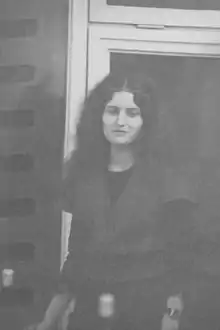Leonida Lari
Leonida Lari (26 October 1949 – 11 December 2011) was a Moldovan poet, journalist, and politician who advocated for the reunion of Bessarabia with Romania. She published 24 volumes of poetry and prose and was a prolific translator of key works from world literature into Romanian.
Leonida Lari | |
|---|---|
 Lari in the 1970s | |
| Member of the Parliament of Romania | |
| In office 1992–2008 | |
| Member of the Supreme Soviet of the Soviet Union | |
| In office 1989–1991 | |
| Personal details | |
| Born | 26 October 1949 Bursuceni, Moldavian SSR, Soviet Union |
| Died | 11 December 2011 (aged 62) Chişinău, Moldova |
| Political party | Christian Democratic National Peasants' Party |
| Other political affiliations | Greater Romania Party Popular Front of Moldova |
Life and career
Leonida Lari was born on 26 October 1949 in Bursuceni, Moldovan SSR, one of the former Soviet Socialist Republics of the Soviet Union. Her parents, Ion and Nadejda Tuchilatu, were teachers. Lari had a younger brother, Leonard Tuchilatu, also a poet, who died when he was only 24 of kidney failure after being exposed to radiation under suspicious circumstances while under mandatory service in the Soviet army.[1]
Leonida Lari graduated from the State University of Chişinău, Moldova, with a major in philology. She worked at the Museum of Literature "D. Cantemir" in Chişinau (1971–1973), was an editor for the journal "Literatură şi Artă" (1985–1988), as well as editor-in-chief (1988–2003) of "Glasul Națiunii", the first publication in the Latin alphabet in the republic of Moldova.
Leonida Lari was one of the leaders of the movement for national emancipation in Bessarabia between 1988 and 1991. She was elected as a representative to the Supreme Soviet of the Soviet Union (1988–1990) and was a member of the Permanent Bureau of the People's Front of Moldova (1990–1992). Between 1990 and 1992, Leonida Lari served as the president of the Christian Democratic League of Women (one of the constituent components of the Social Liberal Party from 2001). In 1992, after repeated threats to the well-being of her children, Leonida Lari and her family fled to Bucharest, Romania. Between 1992 and 2008, Leonida Lari was a representative to the Parliament of Romania.[2]
After a long battle with cancer, Leonida Lari died in Chișinău, Moldova on 11 December 2011. Her death was followed by a state funeral, during which thousands of Moldovans paid their respects.[3]
Works
- Piaţa Diolei (1974)
- Marele vânt (1980)
- Mitul trandafirului (1985)
- Scoica solară (1987)
- Insula de repaos (1988)
- Lumina graitoare (1989)
- Dulcele foc (1989)
- Anul 1989 (1990)
- Lira şi păianjenul (1991)
- Govorâŝij svet (1992)
- Al nouălea val (1993)
- Epifanii (1994)
- Scrisori de pe strada Maica Domnului (1995)
- Lunaria (1995)
- Aldebaran (1996)
- Între îngeri şi demoni (1998)
- Învingătoarele spaţii (1999)
- Insula de repaus (2000)
- Răstignirea porumbeilor (2003)
- Epifanii şi teofanii (2005)
- Infinitul de aur (2006)
- Sibila (2006)
- Traduceri din lirica universala (2009)
- 101 poeme (2009)
Awards and distinctions
References
- "Interviu: "A fost trist să descoperim că zeci de ani viaţa ne-a fost condusă de oameni nu tocmai dotaţi intelectual ca să facă acest lucru"". 25 April 2017.
- "Structura Parlamentului României 2004-2008".
- "Comunicate de presă /". 13 December 2011.
- "15 ani de independenţă - 196 cavaleri ai ORDINULUI REPUBLICII - VIP Magazin". Archived from the original on 2011-12-09. Retrieved 2011-12-16.
External links
- 50 de personalităţi ale epocii 87-89
- Activitatea parlamentară a Leonidei Lari în Camera Deputaților din România
- Populatia este bludnica
- Leonida Lari, keen supporter of Romanian-Moldovan union, dies
- Leonida Lari petrecuta in ultimul drum on YouTube
- Comunicat de presa al Primariei municipiului Chisinau
- Am ramas mai saraci fara Leonida Lari
- Agentia REGNUM din Rusia o ataca pe Leonida Lari
- Stirile ProTV